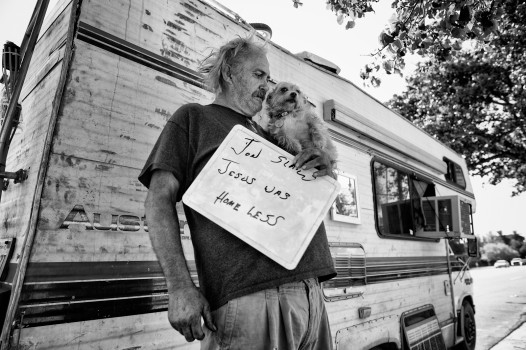
There are some 700,00 homeless in America, many of them children. Maybe 50,000 are veterans. So what?
For the homeless, life can be short and ugly. In general, people without a roof over their head die 40 years earlier, on a par with certain impoverished, war-ridden African nations.
More than 50 percent are mentally ill. Huge numbers suffer from alcohol and/or drug problems contributing to becoming homeless or caused as a consequence of being homeless.
Severe medical problems are rampant in this population. Chronic health problems go untreated or under treated. More prevalent problems like hypertension, diabetes and heart disease lead to secondary complications, including strokes, heart failure, other neurological problems and visual disturbances.
During the last Great Recession, the homeless were 30 times more likely to die from illegal drugs, 150 times more likely to die from a fatal assault, and 35 times more likely to commit suicide (see “The Body Economic” by David Stuckler, M.P.H., PhD and Sanjay Basu, M.D., PhD).
It’s not pretty. But aside from feeling sorry for the plight of the homeless, why care?
Turns out the cost to society of homelessness is, perhaps counter intuitively, quite high. Homeless people have an increased incidence of transmittable infections, illnesses like tuberculosis, some strains of which can be resistant to virtually all treatment.
Homeless people use high cost emergency room facilities with great frequency. For example, for two years during the last recession between 2007-2009 the homeless had 6 million more emergency room visits. Predictably, because homelessness contributes to poor health, there are more and longer hospital stays in this population.
The homeless population also contributes disproportionately to the cost of criminal justice: “Nuisance laws” like panhandling, drinking in public, sleeping in public places, loitering, vagrancy, failure to pay a fine, urinating or defecating in public, or disorderly conduct result in criminal charges and incarceration on a repetitive basis.
Indeed, most jails can identify a small number of “high fliers,” those with multiple incarcerations costing hundreds of thousands if not millions of dollars. Many of these folks are chronically homeless and mentally ill. Most of their offenses are nonviolent and of little danger to others.
There are other indirect costs to society of homelessness. For example, each year the U.S. Forest Service in the Tahoe Basin responds to about 20 fire danger calls caused by homeless people. These 20 calls make up 20 percent of the total number of Forest Service extinguished fires. One day, one of these fires will cause a major conflagration.
Numerous studies have documented the high cost to taxpayers of chronic homelessness, generally defined as one year or more of living on the streets.
A study in Hawaii found that the rate of psychiatric hospitalization was 100 times higher than a comparable non-homeless group.
A University of Texas two-year survey found that each homeless person costs an average $14,480 per year, primarily for overnight jail.
Los Angeles learned that placing four homeless people in permanent housing saved them $80,000 per year (University of Southern Calif News, 11/19/09).
A University of Pennsylvania study found that homeless people with severe mental illness cost $40,451 per person per year and that providing housing for them caused a cost reduction of $16,281 per person per year.
Philip Mangero, former homelessness policy czar for President George W. Bush said, “We learned that you could either sustain people in homelessness for $35,000 to $150,000 a year, or you could literally end their homelessness for $13,000 to $25,000 per year.”
So now we know that providing permanent housing for homeless people actually saves taxpayer money.
Why? Because emergency care and hospitalizations are less frequent and shorter, and police intervention and incarceration rates drop.
And these figures don’t include the indirect savings of lowering the likelihood of infectious disease transmission, the cost to street level retail business in areas where the homeless congregate, or the negative impact of homelessness on tourism in general
This data has both social policy and ethical implications. We can be, at least in reference to the homeless, our brother’s keeper. We can also save taxpayer money by putting a permanent roof over their heads.
So, we still have 700,000 homeless in America, not because of the cost of housing them, not because there are no means to eradicate homelessness, but because the vast, overlapping and competitive bureaucracies that are mandated to solve the problem do not.
Via: https://www.truckeesun.com/news/opinion/why-should-we-care-about-americas-homeless-problem/https://www.truckeesun.com/news/opinion/why-should-we-care-about-americas-homeless-problem/
